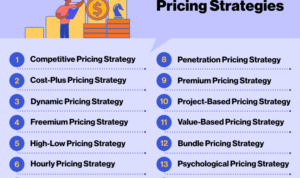Building a Startup Business sets the stage for this enthralling narrative, offering readers a glimpse into a story that is rich in detail with American high school hip style and brimming with originality from the outset.
Get ready to dive into the world of entrepreneurship, where innovation, determination, and strategic planning collide to create successful startup ventures.
Defining Your Startup
In the world of business, a startup is a newly established company designed to develop a unique product or service and bring it to the market. Startups are known for their innovative ideas, agility, and potential for rapid growth.
Key Characteristics of Startups
- High Growth Potential: Startups have the potential to grow quickly and scale their operations in a short period of time.
- Innovative Ideas: Startups often focus on innovative solutions to existing problems, setting them apart from traditional businesses.
- Risk-taking: Startups are willing to take risks and disrupt the market with their bold ideas and approaches.
- Limited Resources: Startups typically operate with limited resources, requiring them to be creative and agile in their decision-making.
Importance of Unique Value Proposition
A unique value proposition is crucial for startup success as it defines what sets the company apart from competitors and attracts customers. By offering a distinct value that addresses a specific need or pain point in the market, startups can carve out a niche for themselves and build a loyal customer base. Having a unique value proposition also helps startups in their branding and marketing efforts, establishing a clear identity and positioning in the market.
Planning and Research
Before diving into the world of entrepreneurship, it is crucial to lay a solid foundation through thorough planning and research. This stage sets the tone for the success of your startup business venture.
The Significance of Market Research
Market research is the compass that guides your business decisions. It helps you understand your target audience, identify competitors, and determine the demand for your product or service. Here are the steps to conduct effective market research:
- Identify your target market and customer demographics.
- Analyze industry trends and competition.
- Collect data through surveys, interviews, and focus groups.
- Use online tools and platforms to gather insights.
Creating a Comprehensive Business Plan
A business plan is your roadmap to success. It Artikels your goals, target market, financial projections, and marketing strategies. Here’s how to create a comprehensive business plan:
- Start with an executive summary that highlights key points.
- Describe your business idea, products/services, and target market.
- Include a detailed marketing and sales strategy.
- Artikel your operational and financial plan.
The Importance of a Feasibility Study
A feasibility study assesses the viability of your business idea before investing time and resources. It helps you evaluate market demand, potential risks, and financial projections. Conducting a feasibility study in the startup phase can save you from costly mistakes down the road.
Building a Team

Building a strong team is crucial for the success of any startup. The right mix of skills, personalities, and experiences can drive innovation and growth.
Essential Roles in a Startup Team
- 1. Founder/CEO: Provides vision, leadership, and strategic direction for the company.
- 2. CTO/CIO: Oversees the technical aspects of the business, including product development and technology strategy.
- 3. CFO: Manages the financial health of the company, including budgeting, forecasting, and fundraising.
- 4. Marketing/Sales Lead: Drives customer acquisition and revenue growth through effective marketing and sales strategies.
- 5. Operations Manager: Handles day-to-day operations, ensuring efficiency and productivity.
Recruiting and Retaining Top Talent, Building a Startup Business
Recruiting top talent for a startup involves showcasing the company’s vision and potential for growth. It’s important to offer competitive compensation, opportunities for career advancement, and a positive work culture. Retaining top talent requires ongoing communication, recognition of achievements, and opportunities for professional development.
Benefits of Diversity in a Startup Team
- Diverse perspectives: Different backgrounds and experiences can lead to more creative problem-solving and innovative ideas.
- Broader market reach: A diverse team can better understand and connect with a wider range of customers and markets.
- Improved decision-making: Diversity can lead to more well-rounded decisions by considering a variety of viewpoints and approaches.
Funding Your Startup
Securing funding for your startup is crucial for its growth and success. There are various sources of funding available to entrepreneurs, each with its own advantages and requirements.
Different Sources of Funding
When it comes to funding your startup, you have several options to consider:
- Bootstrapping: Using your own savings or revenue generated by the business to fund operations.
- Friends and Family: Seeking financial support from those close to you who believe in your vision.
- Angel Investors: High-net-worth individuals who invest their personal funds in startups in exchange for ownership equity.
- Venture Capital: Investment firms that provide funding to startups with high growth potential in exchange for equity.
- Crowdfunding: Raising small amounts of money from a large number of people through online platforms.
- Bank Loans: Borrowing money from financial institutions with the promise of repayment plus interest.
Bootstrapping vs. Seeking External Funding
Bootstrapping involves using your own resources to fund your startup, which gives you full control but limits your growth potential. On the other hand, seeking external funding allows for faster scalability but may involve giving up equity or taking on debt.
Pitching to Investors for Funding
When pitching to investors for funding, it’s important to clearly communicate your business idea, market potential, and financial projections. Be prepared to answer questions and address any concerns they may have. A compelling pitch deck and presentation can make a significant difference in securing the funding you need for your startup.
Developing a Product or Service: Building A Startup Business
Developing a product or service is a crucial step in the startup journey. It involves creating something that solves a problem or fulfills a need in the market. Prototyping and MVP (Minimum Viable Product) play a significant role in this process by helping to test ideas and gather feedback before fully launching a product.
Importance of Prototyping and MVP
Prototyping allows startups to create a preliminary version of their product to test its functionality and gather feedback from potential users. MVP, on the other hand, is the simplest version of a product that can be launched to the market to validate the idea and gather real-world feedback. Both prototyping and MVP help in saving time and resources by identifying flaws and making necessary improvements early in the development process.
Steps in Product Development for a Startup
- Identify the problem or need: Understand the market and target audience to pinpoint the specific problem or need your product will address.
- Conceptualize the solution: Brainstorm ideas and develop a concept for your product that effectively solves the identified problem.
- Prototype development: Create a prototype to visualize and test the product’s features and functionality.
- Build MVP: Develop a Minimum Viable Product with essential features to launch and gather feedback from early adopters.
- Iterate and improve: Use user feedback to iterate on the product, adding new features and enhancing existing ones based on user preferences and needs.
Significance of User Feedback
User feedback is crucial in refining products and services for startups. It provides valuable insights into what users like or dislike about the product, helping in making informed decisions for improvements. By listening to user feedback and continuously iterating on the product, startups can ensure they are meeting customer needs and staying competitive in the market.
Marketing and Branding

Creating a strong brand identity is crucial for a startup to stand out in a crowded market. This involves defining your unique value proposition, target audience, and brand personality. Consistency across all marketing channels is key to building brand recognition and trust.
Role of Digital Marketing
Digital marketing plays a vital role in reaching a target audience in today’s tech-savvy world. Utilizing social media, email marketing, , and online advertising can help startups connect with their target customers effectively. By analyzing data and tracking metrics, businesses can optimize their digital marketing strategies for better results.
Importance of Marketing Budget and ROI
Having a well-defined marketing budget is essential for startups to allocate resources effectively and track their return on investment (ROI). By setting clear goals, monitoring campaign performance, and analyzing ROI, businesses can optimize their marketing efforts for maximum impact. Investing in the right channels and tactics can help startups reach their target audience and drive growth.
Scaling Your Startup
When it comes to scaling your startup, you’ll face both challenges and opportunities. It’s a crucial phase in the growth of your business where you need to carefully plan and strategize for expansion.
Expanding Operations and Entering New Markets
- Identify new markets: Conduct thorough market research to identify potential new markets for your products or services.
- Develop a market entry strategy: Create a detailed plan on how you will enter these new markets, considering factors like competition, regulations, and consumer behavior.
- Adapt your offerings: Customize your products or services to cater to the needs and preferences of the new market segments.
- Build partnerships: Collaborate with local businesses or influencers in the new markets to establish a presence and gain credibility.
Building Scalable Systems and Processes
- Automate repetitive tasks: Implement automation tools to streamline processes and increase efficiency as you grow.
- Invest in technology: Utilize scalable technology solutions that can support your business operations as they expand.
- Focus on customer experience: Ensure that your systems and processes are designed to deliver a consistent and high-quality experience to your customers, even as you scale.
- Monitor and analyze performance: Use data analytics to track the performance of your systems and processes, identifying areas for improvement and optimization.





